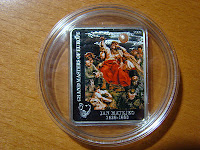Ano: 2009
Valor facial: 5 Dollar
Diâmetro: 30x38 mm
Metal: Prata (.925)
Qualidade: Proof (inc. perola)
Peso: 25gr.
Tiragem: 5000 pçs
Diâmetro: 30x38 mm
Metal: Prata (.925)
Qualidade: Proof (inc. perola)
Peso: 25gr.
Tiragem: 5000 pçs
Cook Islands issued this special coin with an authentic pearl inlaid. Jan Matejko, the most popular creator of romantic visions of Polish history, declared, "Art is a weapon of sorts; one ought not to separate art from the love of one's homeland." This beautiful coin is the second of the series "Old Masters of Europe" and is dedicated to his masterpiece, featured by a real inlaid pearl. The coin obverse depicts his famous painting Wernyhora, with a pearl representing the sun. The reverse depicts Queen Elizabeth II’s profile. Jan Matejko was born in 1838, in Kraków. He was a Polish painter known for paintings of notable historical Polish political and military events. His most famous works include oil on canvas paintings of numerous battles and court scenes, and a gallery of Polish kings. He is counted among the most famous Polish painters. Almost everyone in Poland is, in a sense, brought up on Matejko's large historical paintings. Disseminated in thousands of reproductions, they have for generations, helped the young and some not so young visualize salient events in the history of the nation. To understand the genesis of such historical paintings it should be recalled that at the time in the 19th century when Matejko created these canvases, the Polish lands were partitioned between Russia and Prussia, which morphed into Germany and Austria. In the lands occupied by Russia and Germany, strenuous efforts were made by the occupying powers to stamp out Polish culture. The use of the Polish language was forbidden in schools and to hinder transmission of knowledge about the country's proud history, censorship existed that effectively banned publication of textbooks and the like that dealt with the subject. In these circumstances, historical paintings which could be used as a way of transmitting such knowledge assumed an importance and relevance otherwise seldom accorded to them. Matejko, a fervent Polish patriot, devoted much of his talent to this cause.



